88888888888888888888888888888888888888888888888888888888888888888888888888888888888
Uthman F. Muhammad ’70
88888888888888888888888888888888888888888888888888888888888888888888888888888888888
Contact
Amherst Name
- Calvin Peter S Ward Jr
Family
Amherst Relatives
- Anisah R. Muhammad W'70, P'98,'02
Personal
88888888888888888888888888888888888888888888888888888888888888888888888888888888888
Professional
Employment Information
Former
- DirectorIntrospect Youth Services, Inc.Start:05/2017End:10/2018
- TeacherChicago Board Of EducationStart:01/1996End:01/2003
- Econ Dev ProflUnknown EmploymentStart:01/1991End:01/1994
- Reg ConsultantWoodstock InstitiuteStart:01/1980End:01/1982
- AttorneyWestside Business Improvement Association, Inc.Start:01/1979End:01/1991
- ConsultantMuhammad Ali FoundationEnd:01/1994
88888888888888888888888888888888888888888888888888888888888888888888888888888888888
Amherst
Reunion Class
- 1970
Graduation Year
- 1970
Major(s)
- Anthropology; Sociology
Prizes
- Leeds
Other Academic
Secondary Schools
- DuSable High School
Higher Ed
- The University of Chicago Law SchoolField of Study:LawDegree:Doctor of JurisprudenceYear:1979
- University of Chicago Booth School of BusinessField of Study:BusinessDegree:Master of Bus AdminYear:1978
88888888888888888888888888888888888888888888888888888888888888888888888888888888888
Amherst
Fraternity
- Independent (no fraternity affil)
Post-Graduate
Community/ Professional Activities
- South Austin Madison CorporationRole:Board of Directors
- Chicago Community Development CorporationRole:Board of Directors
- South Austin Job Referral ServiceRole:Board of Directors
- Chatham Neighbor Health CenterRole:Board of Directors
- Direction SportsRole:Member
- Introspect Youth Services, Inc.Role:Member
88888888888888888888888888888888888888888888888888888888888888888888888888888888888
Deceased October 31, 2018
View alumni profile (log in required)
In Memory
Popularly known as “C. P.” during his days at Amherst, Uthman Faruq Muhammad passed away on Oct. 31, 2018, in Chicago, after courageously battling cancer and diabetes-related complications. Born Calvin Peter Ward Jr. on April 3, 1948, in Canton, Miss., his family moved north in 1953 as part of the Great Migration, seeking greater freedom and economic opportunities. After initially settling in Gary, Ind., the family soon relocated to Chicago’s Southside. There Uthman attended a series of public schools, graduating from DuSable High School at the top of his class in 1966.
Uthman loved sports, especially football. While at Amherst, he played under the leadership of legendary coach, the late Jim Ostendarp, with the likes of Doug Swift ’70, Jean Fugett ’72 and Daniel “Mighty” Quinn ’70. He also loved debating issues relating to politics, history and the human condition. He would hold court during roundtable dinner sessions in Valentine Hall that lasted well beyond operating hours. On more than one occasion, the cleaning crew was compelled to kick him and his dozen or so companions out of the dining hall. Not to be undone, they would retreat to Valentine’s upper vestibule and debate, joke and jostle for as long as another hour before finally disbursing.
During his tenure as a student, Uthman made significant contributions to Amherst’s academic, social and cultural evolution. He was a founding member of the Afro-American Society, predecessor of the current Black Student Union and served as its president. His ongoing efforts were significant factors in establishing the Octagon as the official redesigned headquarters for that organization. But perhaps Uthman’s most precious legacy to Amherst was the leadership he provided as an architect of the protest movement that would forever change the College.
On Feb. 18, 1970, Uthman and black student representatives from throughout the Five College area led hundreds of students in the overnight seizure and occupation of several Amherst buildings in protest to the Five College Consortium’s failure to seriously address longstanding grievances regarding perceived academic and cultural-related deficiencies. That occupation was the catalyst for establishing, among other things, Amherst’s Department of Black Studies, an expanded Smith-Amherst Tutorial Program (SATP), which provided academic support and mentoring for the inner-city youth of nearby Springfield, and a commitment to increasing faculty and student diversity at Amherst and the other consortium institutions.
After Amherst, Uthman changed his name upon adopting Islam; earned an MBA from the University of Chicago and a Master of Arts in Teaching (MAT) from Roosevelt University. For more than 35 years thereafter, he worked tirelessly and passionately as a community economic development activist, as well as a public school teacher in Newark and Chicago.
Uthman’s appointment to the Chicago Commercial District Development Commission by Mayor Harold Washington in the mid-1980s was heralded in the local media, as were his small business development achievements with the South Austin Madison Corporation (SAMCOR) and Westside Business Improvement Association (WBIA). Until the very end, he never stopped promoting community development and social justice—and he never stopped teaching, which he loved and considered his second calling, and he never stopped mentoring young people, whom he cherished.
As the co-author of this piece, I, Faruq Abdal-Sabur, would like to share a few very personal thoughts about Uthman that are probably representative of many other Amherst alums who formed a lifelong bond with him. I met Uthman in 1968, my freshman year at Amherst, when he was still C. P. Ward from the Southside of Chicago. I quickly came to see him as a unique person. He was extremely charismatic but could also be annoyingly opinionated. I didn’t really understand why at first, but I really liked him. Coming from Florida at such a tumultuous time in American history, Amherst was a foreign environment to me and just to meet someone that allowed me to lower my defenses and be myself meant everything to me. I soon came to realize that the remarkable thing about Uthman was that he was that kind of special person for a lot of people—not just me. We overlooked his human frailties and loved him for the incredible stress that he took on to help many of us to adjust, survive and thrive at Amherst. He was more than a friend. He was a counselor and a confidante. With all his human frailties, he will be greatly missed by all.
Uthman is survived by his five children: Jamillah Lamb (David); Bilal Muhammad ’98, Luqman Muhammad, Ismail Muhammad and Inshirah Overton ’02 (Aaron). Notably, Bilal and Inshirah are Amherst alums. Additional survivors include his five grandchildren; ex-wife Anisah Muhammad, who is the mother of his five children; his partner, Wilma Edwards; and a host of other relatives and friends.
No one can deny that Uthman infused flavor, flare and a bit of drama into everything he did. And a great many will attest that Amherst reunions will never be the same without him.
Irshad Abdal-Haqq ’72 and Faruq Abdal-Sabur ’73
88888888888888888888888888888888888888888888888888888888888888888888888888888888888
The Takeover
The Amherst Student issue from February 18th, 1970
“Blacks Seize Buildings”
Written by Robert S. Nathan.
“At one o’clock this morning, approximately two hundred and fifty black students from throughout the five-college area occupied four buildings on the Amherst campus. The buildings were Converse Hall, the main administration building which houses the college post office and the college switchboard; the Robert Frost Library; the Amherst Science Center, and College Hall. The blacks also took full charge of their own black culture center and would not admit whites for any purpose. The buildings were evacuated at approximately 3:30 and the blacks secured themselves in the Octagon without comment… At 5:30 this morning, four black Amherst students and one black co-ed delivered the first statement issued by the Five-College Afro-American Committee… Members of the Five-College Community presented President Plimpton with their list of demands at approximately 1:20 p.m.”
“Original Statement”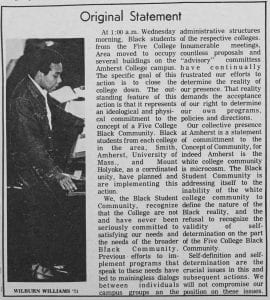
“We, the Black Student Community, recognize that the College are not and have never been seriously committed to satisfying our needs and the needs of the broader Black Community. Previous efforts to implement programs that speak to these needs have led to meaningless dialogues between individuals, campus groups and the administrative structures of the respective colleges. Innumerable meetings, countless proposals and ‘advisory’ committees have continually frustrated our efforts to determine the reality of our presence. That reality demands the acceptance of our right to determine our own programs, policies and directions.”
“Black Demands in Brief”
“The following is an abridged summary of the demands and proposals by the Five College Black Community to the presidents of the respective institutions. Included here is a resume of the specific demands submitted by the Amherst Afro-Am Society to President Plimpton.
Position paper of Amherst Afro-American Society:
Admissions and Scholarships
We demand that:
- Fifteen to twenty-five percent of the class of ’74. The Afro-Am will be willing to design massive search and recruitment operation and to contact all accepted black applicants.
- The financial aid committee set aside $125,000 beginning with the class of 1975 for scholarships for black applicants, and that this amount be adjusted proportionately to the incurring changes of black student enrollment and cost of tuition.
- The admissions committee set aside $7,000 to $10,000 to be used for the recruitment of Blacks. (a) visits by Amherst black students to inner city schools. (b) trips made to Amherst by applicants. (c) the primitive and dissemination of material on Amherst. The Afro-Am will aid in raising funds for these purposes through talks with alumni both black and white, especially the former.
Black Cultural Center
The Black Cultural Center is still in its most inchoate stages of development. We demand the establishment of a budget for the Black Cultural Center for the year ’70-’71, and that funds be set aside specifically for its development in future years.
Summer Programs
Although Amherst’s summer program has concerned itself primarily with black high school students, the Five-College black community feels that the program as its stands has failed in a significant way. Its primary orientation was plainly superficial, lacking not only real academic substance but also devoid of meaningful cultural thrust. Perceived as an overly abstract and diffuse experience, the tutorial project disintegrated into a novel sort of vacation period rather than the high-minded ideal it was originally intended to be.
In light of what we feel has been a clear demonstration of institutional indifference and carelessness, we, the citizens of the Five-College Black community, demand that:
- $95,000 be set aside by Amherst College for use in the summer programs.
- The governing board and staff of the tutorial program be black.
- The program be funded in this order and manner: (1) $30,000 – S.A.T.P. (2) $25,000-Bridge (3) $20,000-A.B.C. (4) $20,000-A.B.C. House.”
Black Studies
We demand that Amherst establish a Black Studies department with a Black director who has the approval of representative of the Five College Black Community. That this program follow guidelines to be presented by Five College representative; and that it become an integral part of the Five College Black Studies Department.”
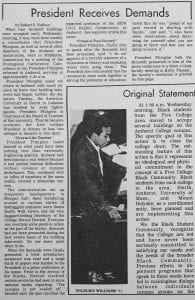 “President Receives Demands”
“President Receives Demands”
Written by Robert S. Nathan.
“When the demands were finally presented, a brief introductory statement was read and a large stack of papers was handed to the President at a press conference at his house… President Plimpton took the demands presented to him at the press conference to a three o’clock faculty meeting in Kirby Theater; the faculty’s resolution is printed on this page.”
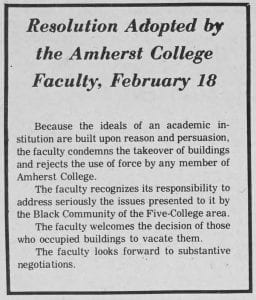 “Resolution Adopted by the Amherst College Faculty, February 18″
“Resolution Adopted by the Amherst College Faculty, February 18″
“Because the ideals of an academic institution are built upon reason and persuasion, the faculty condemns the takeover of buildings and rejects the use of force by any member of Amherst College.”
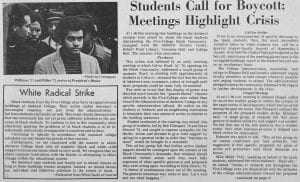 “Student Call for Boycott; Meetings Highlight Crisis”
“Student Call for Boycott; Meetings Highlight Crisis”
“[T]he most immediate initiative taken by white students was call for a general student-faculty boycott of Wednesday’s classes. Over half the student body participated in the boycott; since many of the meeting places were in the occupied buildings, much of the student boycott was on an involuntary basis.” Read second part here.
The Amherst Student issue from February 19th, 1970
“College Meeting in Chapel Conveys Faculty 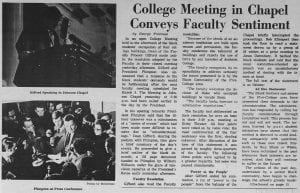 Sentiment”
Sentiment”
Written by George Freeman.
“In an open College Meeting held in the aftermath of the black students’ occupation of four college buildings, Dean of the Faculty Professor Gifford made public the resolution adopted by the Faculty in their closed meeting yesterday afternoon. Gifford and President Plimpton also announced that a response to the black students’ demands would be forthcoming after the next faculty meeting scheduled for March 3.” Read second part here.
The Amherst Student issue from February 23rd, 1970
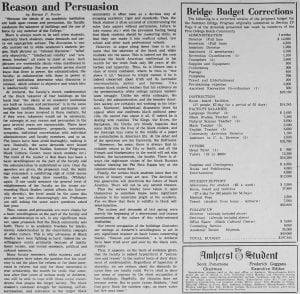 “Reason and Persuasion”
“Reason and Persuasion”
Written by Horace P. Porter.
“Reason and persuasion are not the key issues involved in these matters, for if they were, takeovers would not be necessary, for attempts at any reason and persuasion in the past several years are innumerable… [R]eason and persuasion are mere cloaks for a basic unwillingness on the part of the faculty and the administration to act, in any significant manner, upon proposals that the Black community sets forth.”
The Amherst Student issue from March 12th, 1970
“Black and White Problems”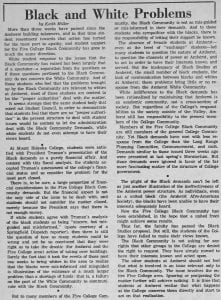
“More than three weeks have passed since the Amherst building takeovers, and in that time student resentment towards that action has turned for the most part to apathy, and student support for the Five College Black Community has gone in much the same direction.
The Amherst Student issue from March 16th, 1970
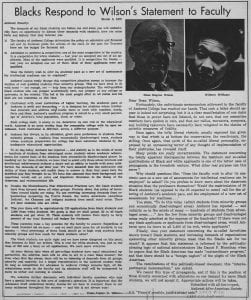 “Blacks Respond to Wilson’s Statement to Faculty”
“Blacks Respond to Wilson’s Statement to Faculty”
Written by the Afro-American Society as a response to Dean Wilson’s letter to the faculty on March 9th, 1970.
“Why should questions like, ‘Does the faculty wish to alter its academic pace so a new set of assessments for intellectual readiness can be employed’ be asked? Do you profess to know more about the classroom situation than the professors themselves… [D]oes your statement concerning the so-called favoritism shown toward Black students, and increasing demands of organizations sponsoring other minority groups mean that the Blacks ask for too much?”
“Black Demands vs. Tight Money”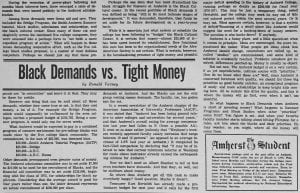
Written by Ronald Varney.
“The Amherst budget is on a very certain, if as yet unpredictable, collision course with ‘priorities.’ How do we know what these are? Well, since Amherst is concerned foremost with quality, we should list three big priorities as good faculty salaries, an exceptional program of study, and more scholarships to keep bright kids coming here. All to sustain this drive for quality, and this is where the money will go first, even when it isn’t too plentiful. So what happens to Black Demands when Amherst is short of spending money?”
88888888888888888888888888888888888888888888888888888888888888888888888888888888888
Feature: Amherst in Black and White
88888888888888888888888888888888888888888888888888888888888888888888888888888888888
Amherst in Black and White
By Horace Porter '72
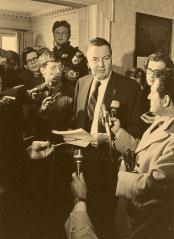 |
The following article is an excerpt from The Making of a Black Scholar (March 2003, University of Iowa Press) by Horace Porter '72. Porter was born to a poor family in rural Georgia, earned a scholarship to Amherst, then went on to earn a doctorate at Yale. He has held teaching positions at Dartmouth, Stanford and the University of Iowa, where he is now a professor of English and chair of African American World Studies. He is the author of Stealing the Fire: The Art and Protest of James Baldwin and Jazz Country: Ralph Ellison in America.
The section of the book excerpted here deals with Porter’s first two years at Amherst, when the college was the scene of antiwar protests, moratoria and other social unrest.
When C. P. Ward '70 (now Uthman Muhammad) stepped down as president of the Afro-American Society, in 1969, suggesting that an executive committee be formed, I was persuaded, along with Barnard Barbour '72 and Gill Taylor-Tyree '72 (both freshmen as well) to become a member of the executive committee, the new administration of the Amherst Afro-American Society.
Given our willingness to serve, we were elected by acclamation. Several upperclassmen also felt that we would give the society its direly needed future stability. The arrival of my class—an unprecedented 16 black men—gave the Afro-American Society a critical mass and a potential membership of 20 or more. While I had served as president of various clubs and organizations in high school and vice president of my senior class, I was ill-prepared for what the coming months, let alone my sophomore year, would bring.
First, I simply didn’t understand how deeply the events of the previous academic year had affected the black students. They had begun to feel disaffected and isolated after the assassination of Dr. Martin Luther King, Jr. And the leaders, like C. P. Ward, wanted the college to take immediate steps to make Amherst sensitive to its new diversity and thereby its new potential. The students still possessed vivid memories of what had happened at Amherst directly after the assassination of Dr. King—just months before. After the assassination, the Amherst community responded in moral outrage. On the night of King’s death, a midnight march was held on the Amherst Common; there were meetings held and speeches given in Mead Auditorium and in Johnson Chapel, where someone cried out: “You killed our only prince of peace!”
Soon after I was elected, the Black White Action Committee—a joint student-faculty-administration initiative—was formed. A week passed, and Professor Leo Marx, a distinguished scholar of American studies, spoke at an evening assembly, challenging Amherst students and faculty alike. Given such a disparity between America’s democratic rhetoric and its institutional reality, Marx asked: “What can the meaning of a liberal education be if it insists upon standards which are irreconcilable with meeting the most pressing moral and human problem of our time? What hope is there for change in this vast nation if this small privileged community has no will to change?”
Amherst of the late 1960s was defined by its passionate moral intensity. And I readily bought into it. I, like most of the black students, wanted to do the right thing. I didn’t question the assumption that black students were not merely college students. We were delegates from America’s black communities. And I believed that Amherst College was a microcosmic test case, possessing a possible solution to the so-called “Negro problem” and “American dilemma.”
There were those who had paid a price, a high price, for our admission to Amherst College. Dr. King was merely one of them. Judge William H. Hastie, an Amherst alumnus, was another. He was the lone black member of the Amherst Board of Trustees during those turbulent years. Hastie had graduated in 1925 as a member of Phi Beta Kappa and as the valedictorian of his class. His nomination in 1937 as the nation’s first black federal judge was vigorously opposed by southern senators. They called him a “leftist,” pointing out his support of civil rights activities. When I saw him for the first time, the Amherst Afro-American Society had become outspoken, and I, as one of the newly elected members of the society’s executive committee, was unexpectedly right in the middle of the action.
On Saturday morning, February 22, 1969, the members of the Amherst Afro-American Society met with members of the Amherst Board of Trustees, including Judge Hastie. The trustees had scheduled an hour of their time to hear our concerns. But we had met prior to that meeting and decided not to discuss the issues with them. The more vocal upperclassmen were tired of talking and felt that the critical issues had been thoroughly discussed. They wanted the trustees’ immediate approval of several demands. We decided to use the occasion to present our demands and then to walk out.
That is exactly what we did. Our statement to the trustees was accusatory and designed to get their attention. We presented our demands, which included the hiring of a black dean, the inclusion of African and Asian languages in the curriculum, the establishment of a Black Studies Program and support for a Black Culture Center. Before we rushed out that morning, Bernard Barbour, a fellow freshman and member of the newly elected executive committee, read the following statement:
We, the members of the Amherst Afro-American Society, feel that the college has reneged on its promises. We wish to establish our utter disgust with the glaring deficiencies in the liberal education which Amherst College boasts to provide. We feel that the Amherst education does not afford black students the exposure necessary to prepare them for leadership in the black community, nor does it prepare white students to react intelligently to that leadership.
I searched Judge Hastie’s face that morning. He seemed both understanding and disappointed. Were we—with our militant rhetoric, our psychedelic clothes and brains, our Afros, our impertinence—the bitter fruit of his decades of hard labor in various American legal fields? Were we not young fakirs caught up in self-righteous sentimentality and radical chic? And yet, some of the questions we raised were real and fair. Why, for instance, was there only one black professor at the college? Why was the history, the art, the literature, the music of black Americans excluded from the Amherst curriculum? I didn’t have long to look at the judge. The demands were handed over and we stormed out, as though highly insulted by the trustees’ charade.
Our walkout at the trustee meeting marked the beginning of a turbulent period in my college life. The politics of the moment and the widespread disenchantment of many college students coincided with my decision to be my own man. I was also struggling to free myself from the long, troubling arm of the South. Still, I hadn’t liked walking out. When some members suggested extending an apology to Judge Hastie, I was one of the first to agree. Even allowing for our “utter disgust” at Amherst’s failure, we knew he had helped pave the way for our presence there.
After the abortive meeting, President Calvin Plimpton ’39 appointed a committee composed of faculty, students and administrators to discuss our demands. The Afro-American Society interpreted the president’s action as an attempt to stall and to avoid making decisions. Two weeks after we walked out of the trustee meeting, the Afro-American Society’s executive committee, along with C. P. Ward, was sent to deliver an amended set of demands to President Plimpton.
On March 12, 1969, the four of us—three freshmen and a junior—sat waiting for the president as he emerged from his inner office. President Plimpton was a true blueblood. His father, George A. Plimpton (Class of 1876), served as a member of Amherst’s Board of Trustees for 41 years. He was the chairman of the Board for 29 years. His brother, Francis T. P. Plimpton ’22, served as a member for almost two decades. Francis Plimpton had also been a distinguished appointee in the Kennedy administration.
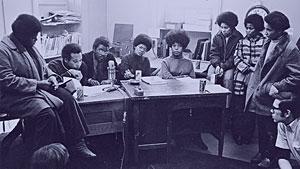 |
I was ignorant of his background as we sat waiting for him. He soon came out of his inner office to greet us. Tall, with slightly slumped shoulders, his voice was reminiscent of Jimmy Stewart’s. Plimpton was a physician. He carried himself with a doctor’s caring manner. Wearing a gray suit, white shirt and blue tie, he was smiling as he came forward to shake our hands, as though ours was a routine visit. For a moment, I wondered if he knew why we were in his office. He shook the hands of the three freshmen first, as we held on defiantly to our militant poses. But his radiating charm was disarming. As he reached out to shake C. P. Ward’s hand, he joked. “You know,” he paused, “I’ve never seen you smile.” His comment—gentlemanly, clever, unexpected—tickled the freshmen executive committee. We laughed. Ward, accustomed to Plimpton’s wit, still didn’t smile.
The rest of the semester was as intense as the beginning. With the pressure on, and following the lead of Stanford, Harvard and Yale, on April 17, 1969, the Amherst faculty voted to implement a Black Studies Program. We all were pleased by that development. But the college was still in a state of turmoil over the Vietnam War. Radical white students involved in Students for a Democratic Society were as active and militant as the Afro-American Society, if not more so.
On April 30, a college-wide moratorium was held. Classes were canceled and the entire day was given over to lectures and seminars discussing the college in relation to issues of the larger society—the shortcomings of Amherst’s curriculum, the war in Viet Nam and racism.
Then on May 14, a second moratorium, dubbed “the black moratorium,” was held. Classes were suspended again. And students and faculty spent the day listening to speeches concerning racial matters, particularly the interaction of blacks and whites at Amherst. During that afternoon, Wilburn Williams '71 spoke to a crowd of over 400 students and faculty in Johnson Chapel. He challenged the whites in the audience to take personal steps toward rectifying the racial crisis in the United States. He told the audience that black students were not “extraterrestrial beings with no humanity about us except the form.” He went on to state: “The changes I ask for are intensely personal and can come only as a result of a continual determination on the part of students to eradicate from their minds the white superiority complex that is so deeply ingrained in American culture.” Williams received a standing ovation.
Ralph Ellison, author of Invisible Man, was the keynote speaker for the evening session. He lectured, without notes, on race and American literature to a capacity crowd in Johnson Chapel.
Ellison’s visit was a sober reminder of a real world beyond Amherst. Since he came near the semester’s end, he helped bring to closure what had been for me an intoxicating and transforming year. I had left Georgia hoping to become a medical doctor. By the spring of my freshman year, I was beginning to think of myself as a writer and an intellectual. My grades weren’t exceptional, but I knew I wasn’t going to flunk out. I was working hard in my courses and reading on my own in the quiet and comfort of the Robert Frost Library. But something was happening to me beyond my grades. I had grown a longer Afro. I had adopted, with a studied vengeance, the bell-bottomed jeans, wire-framed glasses and bookbags of my classmates. When I returned home, my former Spencer classmates called me a “hippie.” I no longer attended church, let alone Sunday school. I had begun to drink alcohol, developing a taste for gin and tonic with a twist of lime. One night I got stoned.
I was on my way to becoming a true Amherst man. The Amherst experience was defined foremost by a searching interrogation of all things, starting with the habits and prejudices of one’s own mind. The unexamined enthusiasm I had brought to Amherst—for college, for certain American possibilities, indeed for life—had vanished. During my high school years, I had believed that America’s race problem would be solved during my lifetime. With a profound perception brought fully into view by Ellison, among other writers, I saw that there would be no easy exit from the complexity of our national fate.
I became angry at myself for having been duped, for believing so uncritically in what now struck me as a gimmicky set of platitudes. I wanted to blot out and erase from my memory the innocent Negro applicant I had been. During this period, my faith—“the substance of things hoped for”—was challenged and tested. Religion, it was often noted at Amherst, “was the opiate of the masses.” I had not read Milton’s Paradise Lost,but I recognized that even in heavenly Amherst, there could be hell. I was beginning to think that everything I believed in was “programmed cant,” as Professor George Kateb would later label it. I wanted to think independently and I wanted to feel free. Sometimes I played a private game. I would set up my Christian guidelines, the points of my life’s compass, on a mental firing range. Then I would shoot them down one by one:
“Honesty is the best policy.” Well, I thought, a good topic for an English 11 essay. But what does it really mean in a corrupt and dishonest world?
“Patience is a virtue.” As Langston Hughes sums it up: “What happens to a dream deferred?/ Does it dry up/ like a raisin in the sun? . . . / or does it explode?”
“Do unto others as you would have them do unto you.”
This one, I reasoned, should be printed on red, white and blue fliers, then dropped from airplanes throughout the country. The moral campaign should start in the South.
I now realized that the North wasn’t the promised land I had imagined. The panoramic view of the Pelham Hills I had seen my first dreamy afternoon at Amherst was still breathtaking. But now I viewed those hills with shocking recognition in a corner of my mind. Race mattered. South and North, it mattered.
I remained optimistic in a sincere way. As time would prove, I was still deeply Christian. I still kept the faith. Yet I needed to doubt, to question, to set aside temporarily so much of what I had thought and believed. Disbelief was a necessary stage in my moral and intellectual evolution.
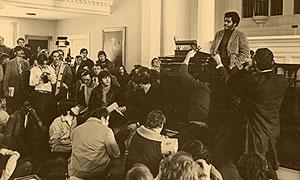 |
Nothing in my experience prepared me for the takeover of four buildings by black students during my sophomore year. The takeover plan was simply designed and secretly executed. Black students from Smith, Mount Holyoke and the University of Massachusetts would meet at Amherst. The college would serve as the focal point of our collective black disappointment. In the wee hours of February 18, 1970, black students who previously had hidden in Converse Hall, the science center, Robert Frost Library and College Hall would come out of their hiding places and open the doors for the protestors already assigned to specific buildings. Then they would chain and lock the doors.
The buildings were taken without incident around 1 a.m. and were evacuated late in the afternoon of the same day. It was a sensational moment in the college’s history. The Amherst Student ran an extra with the headline: “Blacks Seize Buildings.” President Plimpton was pictured at a press conference. And he wasn’t smiling this time. After receiving the demands addressed to the presidents of the Five College community, Plimpton indicated his disapproval of “a forceful takeover.” He added, “I also have some reservations about determining for yourself [students] what you are going to learn and how you are going to learn it.” Later that afternoon, the Amherst faculty met and adopted the following resolution:
Because the ideals of an academic institution are built upon reason and persuasion, the faculty condemns the takeover of buildings and rejects the use of force by any member of Amherst College.
The faculty recognizes its responsibility to address seriously the issues presented to it by the black community of the Five College area.
The faculty welcomes the decision of those who occupied buildings to vacate them. The faculty looks forward to substantive negotiations.
As a member of the Afro-American Society’s executive committee, I remained outside the buildings as one of the spokesmen for the group. I was assigned the task of writing an immediate response to the faculty’s resolution. I wrote several drafts that were amended, criticized and polemicized. On Monday, February 23, 1970, the Amherst Student ran my editorial, “Reason and Persuasion.”
Calling reason and persuasion “mere cloaks for a basic unwillingness on the part of the faculty and the administration to act . . . upon proposals that the black community sets forth,” I wrote:
There is always much to be said when students, especially black students, make demands and carry out appropriate actions. The discussion is usually carried out in white academia’s esoteric jargon. Such phrases as ‘rational discourse,’ ‘scholarly objectivity,’ ‘intellectual validity’ and ‘academic freedom’ all come to mind at once.
I had gotten caught up in a student revolution spreading across the United States. It had generational and racial roots. For black students, the revolutionary energy had taken nearly a century to arrive. We, all recently transformed “Negroes,” saw ourselves, as Nina Simone sang back then, “as young, gifted and black.” Black—the color of night, sin, shame and grief—had become beautiful. We were self-consciously redefining ourselves, not through the eyes of whites, but staring at our marvelous black Afros, our new black selves in the mirror. We now possessed “Black Pride” because “Blackness was a state of mind.” It was a heady time. And we—though young, militant and black—were ill-prepared for the complexity of our own bewildering fate. We were still undergraduates, freshmen and sophomores a long way from home.
Photo: Archives and Special Collections
88888888888888888888888888888888888888888888888888888888888888888888888888888888888
Contact
Amherst Name
- Calvin Peter S Ward Jr
Family
Amherst Relatives
- Anisah R. Muhammad W'70, P'98,'02
Personal
88888888888888888888888888888888888888888888888888888888888888888888888888888888888
Professional
Employment Information
Former
- DirectorIntrospect Youth Services, Inc.Start:05/2017End:10/2018
- TeacherChicago Board Of EducationStart:01/1996End:01/2003
- Econ Dev ProflUnknown EmploymentStart:01/1991End:01/1994
- Reg ConsultantWoodstock InstitiuteStart:01/1980End:01/1982
- AttorneyWestside Business Improvement Association, Inc.Start:01/1979End:01/1991
- ConsultantMuhammad Ali FoundationEnd:01/1994
88888888888888888888888888888888888888888888888888888888888888888888888888888888888
Amherst
Fraternity
- Independent (no fraternity affil)
Post-Graduate
Community/ Professional Activities
- South Austin Madison CorporationRole:Board of Directors
- Chicago Community Development CorporationRole:Board of Directors
- South Austin Job Referral ServiceRole:Board of Directors
- Chatham Neighbor Health CenterRole:Board of Directors
- Direction SportsRole:Member
- Introspect Youth Services, Inc.Role:Member
88888888888888888888888888888888888888888888888888888888888888888888888888888888888
Amherst
Reunion Class
- 1970
Graduation Year
- 1970
Major(s)
- Anthropology; Sociology
Prizes
- Leeds
Other Academic
Secondary Schools
- DuSable High School
Higher Ed
- The University of Chicago Law SchoolField of Study:LawDegree:Doctor of JurisprudenceYear:1979
- University of Chicago Booth School of BusinessField of Study:BusinessDegree:Master of Bus AdminYear:1978
- 8888888888888888888888888888888888888888888888888888888888888888888888888888888888888888888
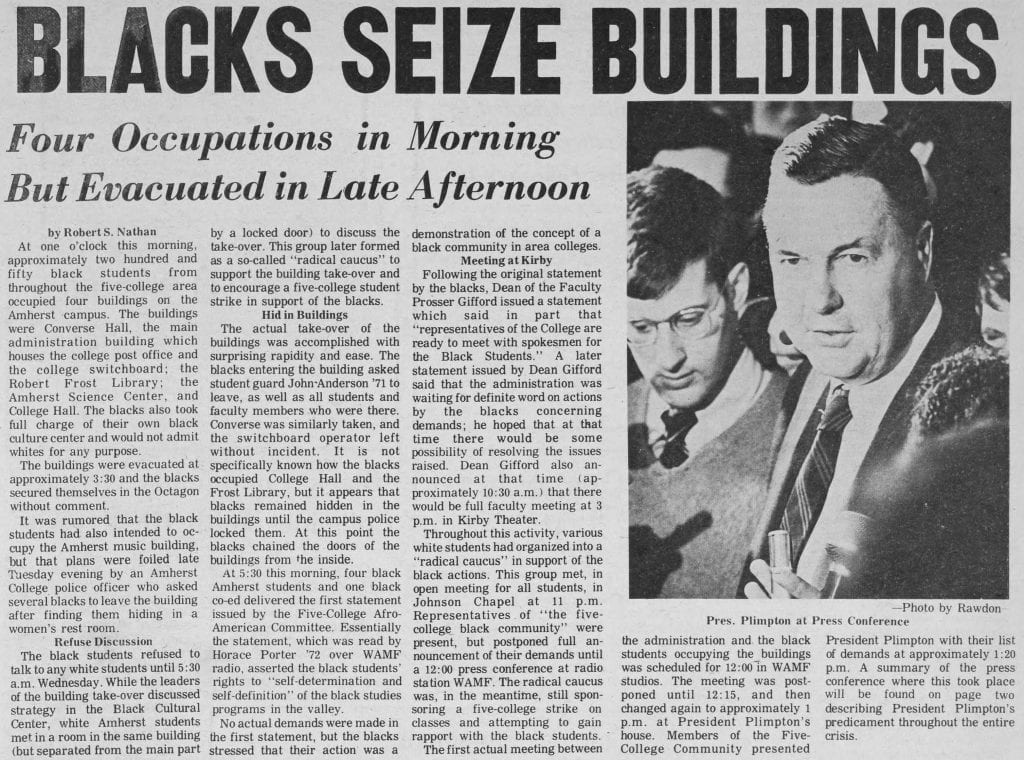
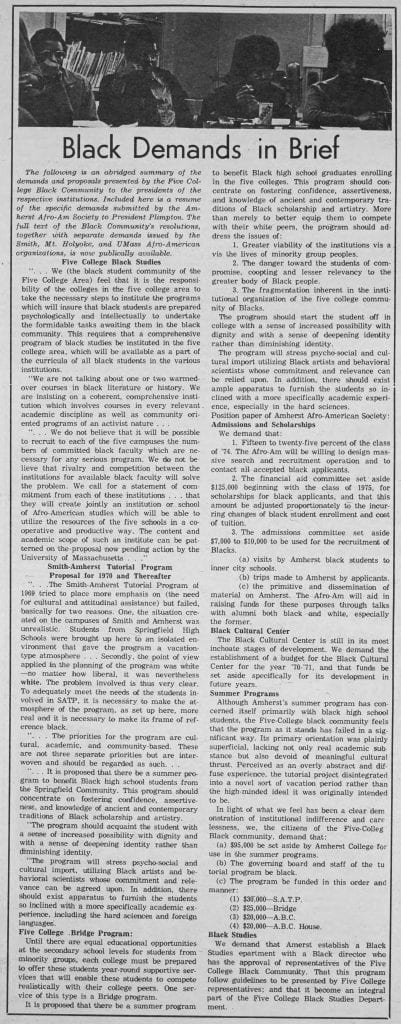
No comments:
Post a Comment